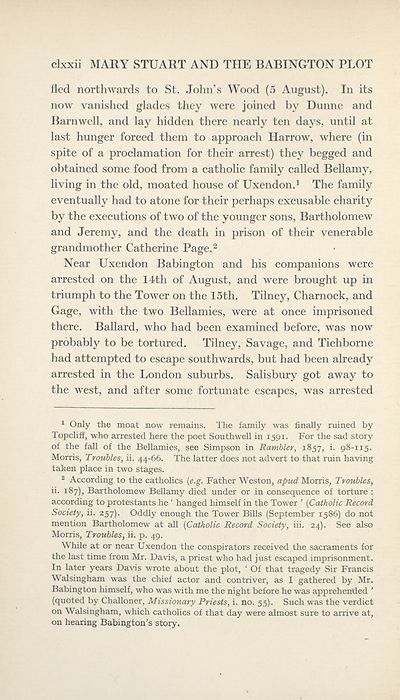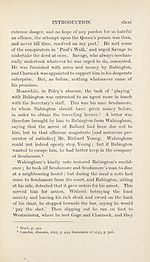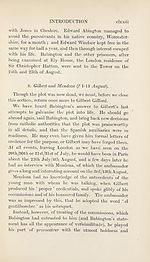Series 3 > Mary Queen of Scots and the Babington plot
(177) Page clxxii
Download files
Complete book:
Individual page:
Thumbnail gallery: Grid view | List view

clxxii MARY STUART AND THE BABINGTON PLOT
fled northwards to St. John’s Wood (5 August). In its
now vanished glades they were joined by Dunne and
Barnwell, and lay hidden there nearly ten days, until at
last hunger forced them to approach Harrow, where (in
spite of a proclamation for their arrest) they begged and
obtained some food from a catholic family called Bellamy,
living in the old, moated house of Uxendon.1 The family
eventually had to atone for their perhaps excusable charity
by the executions of two of the younger sons, Bartholomew
and Jeremy, and the death in prison of their venerable
grandmother Catherine Page.2
Near Uxendon Babington and his companions were
arrested on the 14th of August, and were brought up in
triumph to the Tower on the 15th. Tilney, Charnock, and
Gage, with the two Bellamies, were at once imprisoned
there. Ballard, who had been examined before, was now
probably to be tortured. Tilney, Savage, and Tichborne
had attempted to escape southwards, but had been already
arrested in the London suburbs. Salisbury got away to
the west, and after some fortunate escapes, was arrested
1 Only the moat now remains. The family was finally ruined by
Topcliff, who arrested here the poet Southwell in 1591. For the sad story
of the fall of the Bellamies, see Simpson in Rambler, 1857, i. 98-115.
Morris, Troubles, ii. 44-66. The latter does not advert to that ruin having
taken place in two stages.
2 According to the catholics (e.g. Father Weston, apud Morris, Troubles,
ii. 187), Bartholomew Bellamy died under or in consequence of torture :
according to protestants he ‘ hanged himself in the Tower ’ (Catholic Record
Society, ii. 257). Oddly enough the Tower Bills (September 1586) do not
mention Bartholomew at all (Catholic Record Society, iii. 24). See also
Morris, Troubles, ii. p. 49.
While at or near Uxendon the conspirators received the sacraments for
the last time from Mr. Davis, a priest who had just escaped imprisonment.
In later years Davis wrote about the plot, ‘ Of that tragedy Sir Francis
Walsingham was the chief actor and contriver, as I gathered by Mr.
Babington himself, who was with me the night before he was apprehended ’
(quoted by Challoner, Missionary Priests, i. no. 55). Such was the verdict
on Walsingham, which catholics of that day were almost sure to arrive at,
on hearing Babington’s story.
fled northwards to St. John’s Wood (5 August). In its
now vanished glades they were joined by Dunne and
Barnwell, and lay hidden there nearly ten days, until at
last hunger forced them to approach Harrow, where (in
spite of a proclamation for their arrest) they begged and
obtained some food from a catholic family called Bellamy,
living in the old, moated house of Uxendon.1 The family
eventually had to atone for their perhaps excusable charity
by the executions of two of the younger sons, Bartholomew
and Jeremy, and the death in prison of their venerable
grandmother Catherine Page.2
Near Uxendon Babington and his companions were
arrested on the 14th of August, and were brought up in
triumph to the Tower on the 15th. Tilney, Charnock, and
Gage, with the two Bellamies, were at once imprisoned
there. Ballard, who had been examined before, was now
probably to be tortured. Tilney, Savage, and Tichborne
had attempted to escape southwards, but had been already
arrested in the London suburbs. Salisbury got away to
the west, and after some fortunate escapes, was arrested
1 Only the moat now remains. The family was finally ruined by
Topcliff, who arrested here the poet Southwell in 1591. For the sad story
of the fall of the Bellamies, see Simpson in Rambler, 1857, i. 98-115.
Morris, Troubles, ii. 44-66. The latter does not advert to that ruin having
taken place in two stages.
2 According to the catholics (e.g. Father Weston, apud Morris, Troubles,
ii. 187), Bartholomew Bellamy died under or in consequence of torture :
according to protestants he ‘ hanged himself in the Tower ’ (Catholic Record
Society, ii. 257). Oddly enough the Tower Bills (September 1586) do not
mention Bartholomew at all (Catholic Record Society, iii. 24). See also
Morris, Troubles, ii. p. 49.
While at or near Uxendon the conspirators received the sacraments for
the last time from Mr. Davis, a priest who had just escaped imprisonment.
In later years Davis wrote about the plot, ‘ Of that tragedy Sir Francis
Walsingham was the chief actor and contriver, as I gathered by Mr.
Babington himself, who was with me the night before he was apprehended ’
(quoted by Challoner, Missionary Priests, i. no. 55). Such was the verdict
on Walsingham, which catholics of that day were almost sure to arrive at,
on hearing Babington’s story.
Set display mode to:
![]() Universal Viewer |
Universal Viewer | ![]() Mirador |
Large image | Transcription
Mirador |
Large image | Transcription
Images and transcriptions on this page, including medium image downloads, may be used under the Creative Commons Attribution 4.0 International Licence unless otherwise stated. ![]()
| Scottish History Society volumes > Series 3 > Mary Queen of Scots and the Babington plot > (177) Page clxxii |
|---|
| Permanent URL | https://digital.nls.uk/127236165 |
|---|
| Attribution and copyright: |
|
|---|
| Description | Over 180 volumes, published by the Scottish History Society, containing original sources on Scotland's history and people. With a wide range of subjects, the books collectively cover all periods from the 12th to 20th centuries, and reflect changing trends in Scottish history. Sources are accompanied by scholarly interpretation, references and bibliographies. Volumes are usually published annually, and more digitised volumes will be added as they become available. |
|---|


